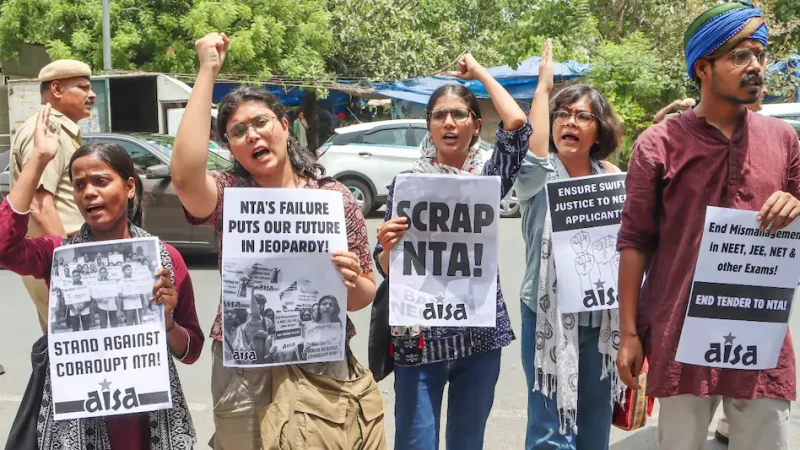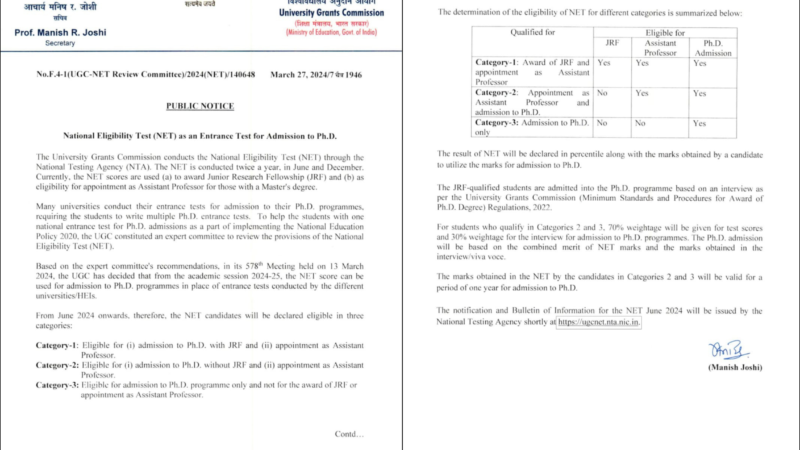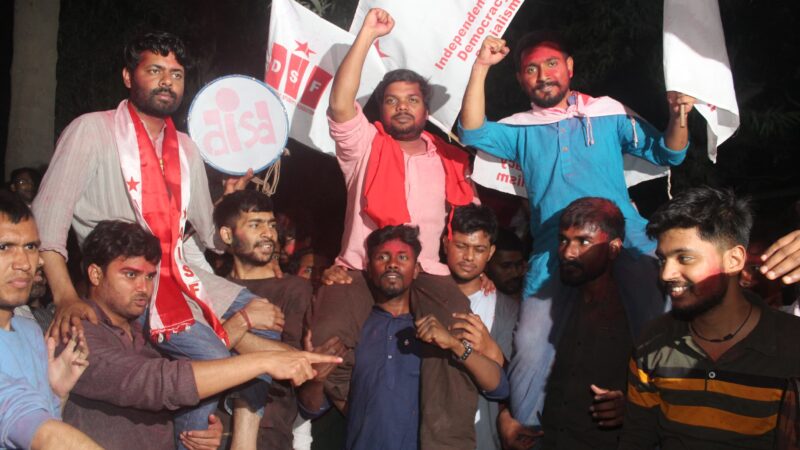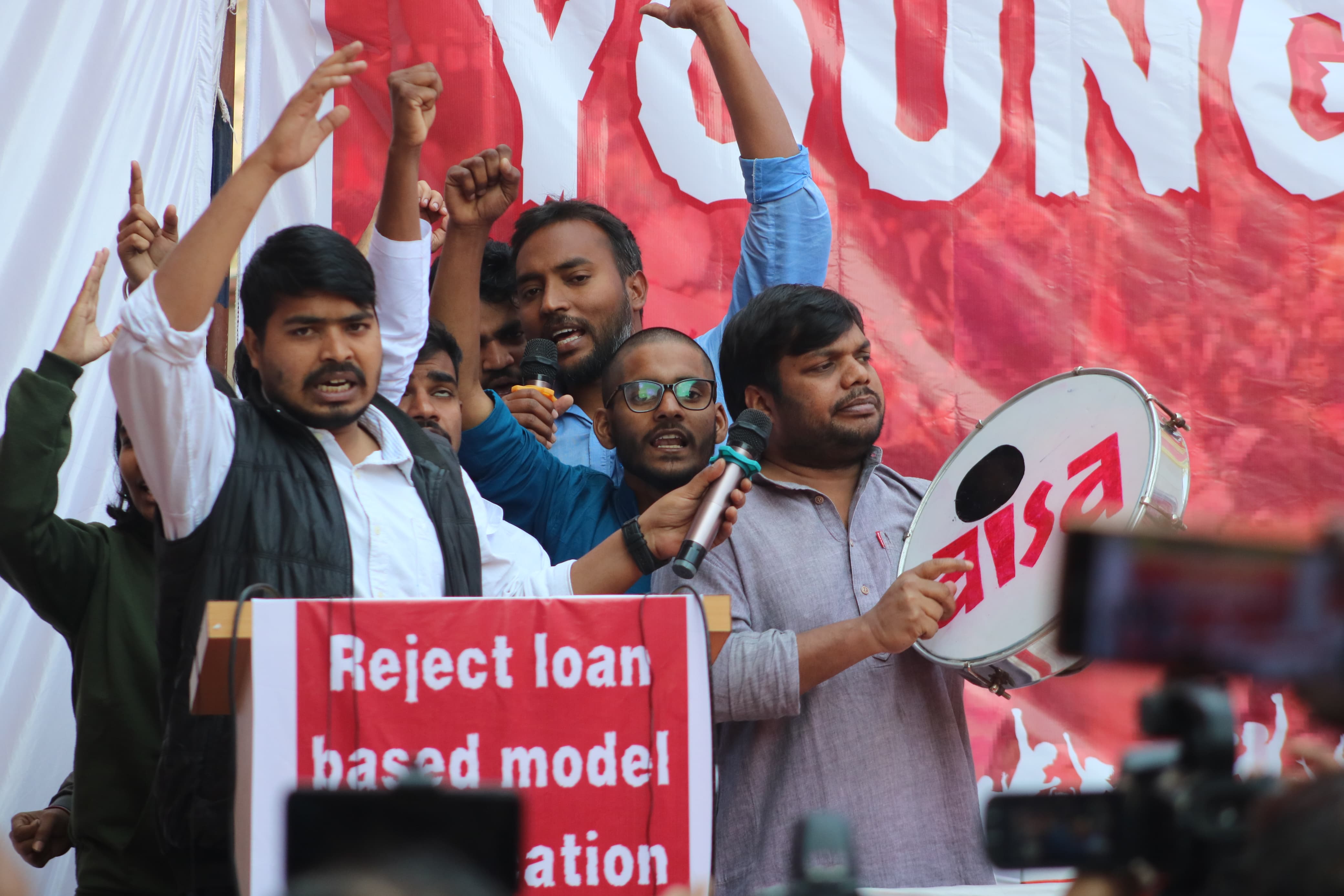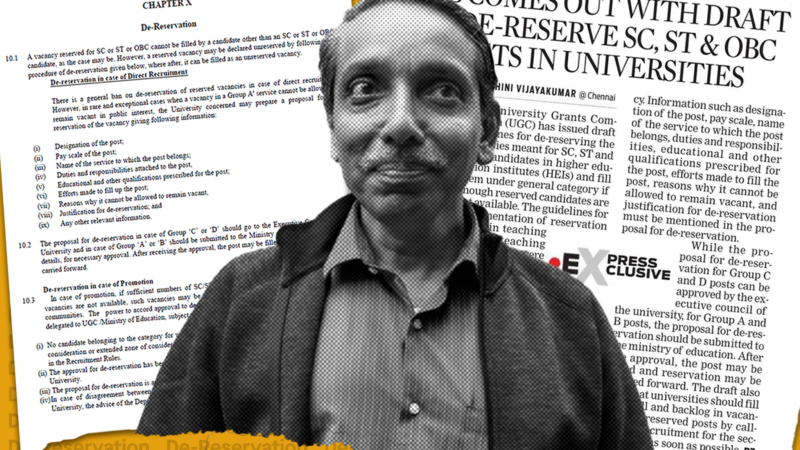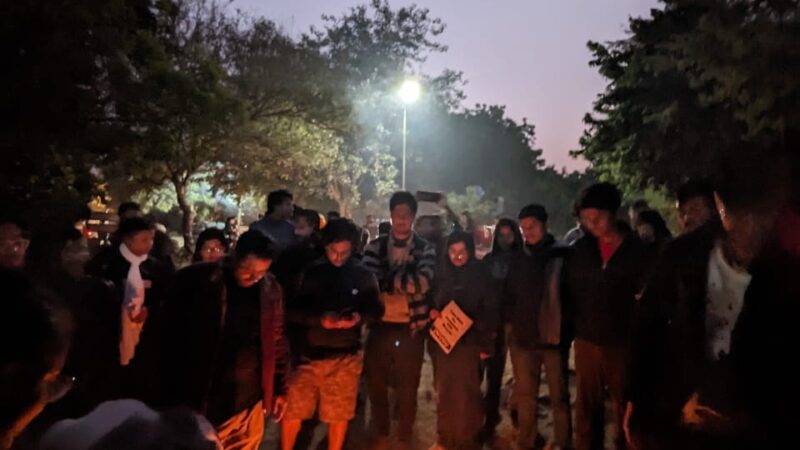#OccupyUGC: AISA National Call for “Delhi Chalo” 8-9 December 2015
On 21st of October the students from different universities of Delhi stormed the gate of UGC in an outrage against the UGC’s decision to discontinue non-NET research fellowship. They occupied the inner premises of UGC demanding scrapping of UGC’s decision to discontinue the Non-NET Fellowship. The students stayed days and nights in the UGC premises and built up what has become the historic #OccupyUGC movement.
Also Read: AISA Statement: Students march to #OccupyUGC while MHRD tries to Spread Confusion
Interestingly the decision to discontinue the research scholarship was taken in the 7th October meeting of a UGC committee which was formed to decide ‘increase in the fellowship’. This abrupt and shocking decision united students from universities across the country and generated an unprecedented movement against fund-cut and commercialisation of education in India. Along with students, the occupy at UGC saw mass participation of teachers, elected Teacher Associations from all universities in Delhi, activists of people’s movements and the common people of Delhi. The #OccupyUGC movement, in fact has spread to colleges and universities across the country. Protests are being organised in Hyderabad, NEHU Shillong, Chennai, Mumbai, Kolkata, Wardha, AMU, Allahabad, Pondicherry, Chandigarh, Sagar, Rohtak and elsewhere in solidarity. Regional offices of the UGC across the country have seen spirited protests by students. With every crackdown from the police, the mass participation in the movement has only swelled.
Also Read: Students Occupy UGC in Protest Against Modi Governments decision to Scrap Non-NET Fellowship
Scrapping of Non-NET Fellowship: A Blow to Research in India The non-NET fellowship which is given to research scholars in Central Universities is a life-line in pursuing research for the students. Generation of new knowledge by original, quality and rigorous research by full-time researchers is essential for any developing society. Since Independence, public-funded universities had been envisioned for the purpose of promoting cutting-edge research by full-time research scholars. Scholars devote crucial years of their life in producing research for the society and the non-NET fellowship is only a “minimum wage” that is barely enough to sustain the daily needs of the scholars.
The recent policy shift of cut in public funding and drive for private funding will have two-fold effect : (a) it will push out students from common and deprived backgrounds from the arena of higher education and research and (b) with corporate profit motive dominating the arena, autonomy of ideas and sensitivity to social needs in a diverse and developing country like ours will be severely compromised.
So the decision to scrap the Non-NET fellowship generated mass protest all over the country. In response to the protest, the UGC and the MHRD have only been issuing diversionary notices, ordered lathi charge on students rather than meeting them and listening to their demands. The UGC and the MHRD along with the student organisation of BJP/RSS- the ABVP have been spreading that the fellowship will be ‘continued and a Review Committe has been formed to look into different aspects of disbursing the fellowship’. But the protesters have refused to be convinced by the lies spread by government machinery and the ABVP. Students have correctly pointed out that the mandate of the so-called Review Committee (as specified in different UGC/MHRD notifications) is to actually reduce the scope of the fellowship by introducing economic/merit or other unspecified restrictive criteria.
The #OccupyUGC movement has categorically rejected the farcical mandate of the Review Committee and articulated that :
- Getting into research rather than getting employed after graduation or masters degree is not an easy decision for students in India. Pursuing research only becomes possible when there is institutional financial support. Pursuing research is also creation of knowledge for the country and society for which the students should be duly paid. Thus any restrictive criteria in giving research scholarship will only make it impossible for students to pursue research. Students from marginalised communities and women who get into higher educational institutions after fighting out societal discriminations and family pressure will be the worst affected. Moreover, when every students has to go through a screening process to get into research in any Indian University, why does the UGC need to introduce any other criteria? Thus the movement has rejected the mandate of the review committee to introduce any restrictive criterion in disbursing research fellowship.
- The fellowship must increase from the present scale of Rs 5000/8000 to Rs. 8000/12000 for M.Phil./Ph.D. commensurate with increase in JRF. The fellowship must also be linked to inflation index for all future purposes.
- The fellowship must be expanded to all state universities without any exclusionary criteria and with an increased rate.
Massive Fund-Cuts in Basic Science Research: At this hour when a massive movement is going on against the scrapping of non-NET fellowship, disturbing news is coming about fund-cuts in science research institutes. • Ministry of Science and Technology has directed CSIR (Council for Scientific and Industrial Research) to generate 50% of research funding on their own.• IIT’s have also been asked to partner industries for funding research. (The Hindu 28 Oct 2015). • CSIR has announced that no ‘travel grants’ will be given to the researchers this year due to budgetary constraints (CSIR website). • SERB (Scientific and Engineering Research Board) is also not giving revised amount of UGC-NET fellowship (SERB website). • On the contrary, to satisfy its obsession with ‘rankings’ the govt. is channelizing funds for select elite institutions thereby denying the same to others. (Economic Times 30 Oct 2015). • AICTE in the name of ‘quality’ has decided to cut down total UG Engineering seats by as much as 40% over the next few years, from from 16.7 lakh now to 10-11 lakh! Clearly, this is yet another move to open space for the foreign private players seeking entry via WTO! The combined effect of such across the board cuts in public-funding for basic sciences will push the science research into the clutches of corporate interests. Needless to say, this will restrict the access of common students into research and dictate the content of research by corporate sector’s profit greed and not by people’s need.
Impending Negotiations at WTO – Higher Education to be Transformed into a Commodity from a Right : It is not surprising that the decision to scrap fellowship comes in the month of October, just 2 months before the 10th Ministerial meeting of WTO at Nairobi, Kenya in December 2015, where the BJP-led central government is preparing to enter into a ‘binding commitment’ to make higher education a ‘tradable service’ at WTO! If the Indian government finalises its deal with the WTO, it would essentially mean that India on its own is agreeing to declare the country’s Higher Education as ‘tradable service’ open to global profit mongering corporates. To be precise, higher education in India will no more be treated as a ‘public good’ which the government should provide to its citizens for national self-reliance; rather it would be treated as a ‘tradable service’ in the global market which has to be sold by big profit driven corporates and bought by students at exorbitant fees. It would render higher education a commodity and students to customers. Presently in India a minuscule minority of students can reach higher education. The vast majority of young people hailing from common, poor and socially marginalised communities such as the SC/ST/OBC, minorities and women are deprived from even accessing higher education because of inadequate number of affordable public funded higher education institutions. Under the WTO regime, it would become impossible for students from these backgrounds to even dream of getting higher education.
Surrender of country’s sovereignty to WTO: WTO was constituted to serve the interests of the developed countries at the cost of accessibility of people in the third world as well as under-developed countries to basic rights. Along with a paradigm shift in higher education from being a right of people to a commodity, commitment to WTO in higher education would also mean a complete surrender of the country’s sovereignty to decide upon its own higher education based on need of the people of the country. The international laws of WTO regime and its supervisory bodies will make sure that governments of the nations under WTO do not formulate policies in contravention that has been decided by the influential global powers.
Fund-Cuts in Education and WTO Conditionalities: The paradigm of ‘free trade’ under WTO regime will compel nations to provide a ‘level playing ground’ for all service providers in respective sectors. For higher education, this would mean that the government will have to take active steps to ensure that public-funded institutions are treated at the same level with private and foreign corporates offering higher education. There will be a steady erosion of all existing subsidies and affirmative policies in public institutions, as any public subsidy will be considered a violation of the ‘level playing ground principle’ vis-a-vis private and foreign ‘traders’ in higher education. What can be more tragic and condemnable than the fact that after almost 70 years of hard earned independence the government of India is going to compromise the sovereignty of its people to have a say on the higher education of the country to the hands of WTO legal instruments? The recent moves to scrap/restrict research fellowship and massive fund cuts for science research are thus nothing but steps by the central government to send a ‘compliance report’ to its masters in the WTO.
The government is preparing to push the country’s future in such a direction without even taking the consent of the parliament or state legislative assemblies or the people of India. The world has recently seen how the people of Greece gave their opinion regarding Greece’s commitment to the EU. Is it too much to ask for the people of this country to be informed about the provisions under WTO and be consulted before the government proceeds to sell out education in the upcoming WTO meeting of December? Why is the government not making the details of the terms of negotiation public? Why are things being done in such a secretive manner? In the land of Bhagat Singh and Babasaheb Ambedkar, such a sell-out of country’s sovereignty, and compromise of the government’s responsibility to provide higher education and ensure social justice MUST Not be allowed.
In the month of December the farcical Review Committee on UGC research fellowship is supposed to submit its report. December is also the month when the our Ministers will fly down to Nairobi to sell out our Higher Education at WTO. It is utmost necessary that we ensure a complete chakka jam of the UGC-Central Government machinery to ensure our right to education. Join a series of united Protest Actions:
Nov 18 : Mass Deputation from UGC to MHRD (called by # OccupyUGC),
Nov 26 : Rally at Parliament (of FEDCUTA,AIFUCTO,National Platform in Defence of Education),
Dec 8 : AISA’s National Call Delhi Chalo -All India Resistance Camp (with AIFRTE),
Dec 9 : Protest Action (called by # OccupyUGC with AIFRTE)
Keep Higher Education Out of WTO! Stop Fund-Cut!
Restore, Enhance, Expand UGC Non-NET Fellowship!

